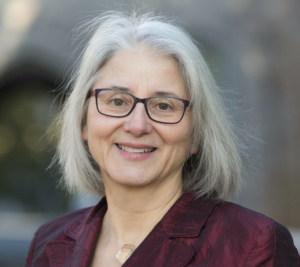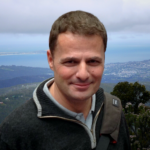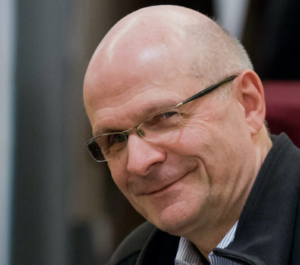
With an ever-increasing world-wide concern and focus on climate change, it was heartening and promising to read this issue’s contribution to Voices from the Field. Using the Appreciative Inquiry process, Gertraud Wegst and Dr. Reto Diezi, along with the expertise of an organised group of European Appreciative Inquiry (EAI) practitioners, supported the launch of a program across Germany that focussed on climate change in everyday life. It is my pleasure to introduce you to such outstanding and inspirational work, as presented by Gertraud and Reto, this issue’s Voices from the Field.

The Appreciators, Coaching Consulting Training
Dr Reto Diezi, also based in Germany, is a coach, Appreciative Inquiry practitioner, business consultant, and chairman of the board of an investment foundation for pension funds. Reto also served as CEO of the asset management company of a European insurance group and as managing director of various mutual funds and asset management companies in Europe. A former Swiss track & field champion and record holder, Reto joined The Appreciators in 2013.
Frankfurt, Germany, November 2019: The Appreciators engaged with the nationally successful, internationally recognized German project Stromspar-Check (SSC). The project, sponsored by the German government, is a partnership between two organizations and consults with more than 370,000 low-income households about energy-saving practices to substantially reduce their energy costs. The Appreciative Inquiry (AI) process supported two national leaders and 20 regional coordinators in the launch of their new program focus on “Climate Protection in Everyday Life” and in defining its strategic position.
Stromspar-Check: The project organisation and its challenge
You can ask Marlene Potthoff and Eva Marx, the two national project leaders, how to keep a marriage alive between two totally different organisations: the German Caritas Association (DVC), Germany’s largest social welfare organization, and the German Federal Association of Energy and Climate Protection Agencies (eaD). Since 2011, they have jointly led Stromspar-Check (SSC).
The consultants for the households are long term unemployed people, trained by the SSC for this job. Through their training and working experience, they have a chance to successfully return to the labour market.
Marlene from Caritas, located in Frankfurt, and Eva from eaD, located in Berlin, run the project representing their organisations together with 23 regional coordinators. They work with their SSC teams in more than 150 different German cities. The eaD trains the consultants, about 900 nationwide, and Caritas recruits, leads and supports them onsite. Keeping a project going with that many cooks involved, from the federal government to local authorities to local communities, is only possible with an enormous commitment to underprivileged people and the environment. Marlene and Eva, together with the coordinators and the whole SSC project team, are a model of success, and are nationally and internationally recognized for what they do.
Their bi-annual two-day meeting in November 2019 was in Frankfurt. This was the only time for the leaders and coordinators to see each other in person. The purpose was to prepare for the launch of a new project focus: “Climate Protection in Everyday Life”. The launch was planned for some months later, under circumstances which were not perfect.
Gertraud Wegst, leadlink of The Appreciators, a small network of coaches and consultants, offered to further this project through an AI process, gladly accepted by Marlene and Eva. Lacking any deeper knowledge of AI, they trusted Gertraud and her commitment to support the project.
The meeting date was set, planned to be at the same time as a gathering of the European AI community where Mille Themsen Duvander was going to facilitate a workshop titled “Organic Growth: Balancing lifegiving learning processes in the profession of Appreciative Inquiry Practitioners”. There were only a couple of weeks for Gertraud and Reto Diezi, the AI facilitators, to prepare the workshop, and make sure that the project leaders learned enough about the AI process to launch it, while also involving the coordinators in the process.
Discovery: Questioning the ‘What’ and ‘How’? Go back to the ‘Why’!
In regular 90-minute conference calls with the project leaders, the AI facilitators came to understand the Stromspar-Check project and its complexity, and introduced the project leaders to the philosophy and methodology of Appreciative Inquiry. The purpose and outcomes of the whole process were defined, and a prep team was created. A decision was made to undertake a full AI Summit, starting with pair interviews on strengths, success stories and wishes. Questions included the concept of the climate protection project, which at this stage was a helpful step to further the project. The key was good selection of the pairs for the interviews across the two organisations – the project leaders did an excellent job in selecting them.
Appreciative Inquiry: What?
Many of the coordinators have consultant backgrounds, and wanted to know more about AI, which was completely new to them. Balancing the knowledge transfer and the experience level of individuals was a dance. What worked was explaining what we did as facilitators as we did it, steering the process while keeping them eager to learn and experience more of the 5D cycle.
Harvesting powerful stories and feedback for the project group
The thoughtfully mixed pairs led to inspiring interview experiences for the participants. Surprising stories emerged which were very helpful to overcome emotional hurdles. Three groups of four pairs each shared their findings in 90-minute calls. They were asked to bring the best stories to Frankfurt to share them with the whole team. The results were awesome: exciting stories, positive energy and regained inspiration. A strong “Why” was impressively present, and the group working on the climate protection concept received valuable feedback, enabling them to finalize their plan.
The Summit in Frankfurt
There were high dynamics both before and during the gathering in Frankfurt. As the Stromspar-Check Summit was integrated into a European AI practitioner meeting, detailed planning was of critical importance. A storybook of 27 pages for the Summit was created to enable smooth facilitation.
The SSC people met among themselves, facilitated by Eva and Marlene, on the morning of November 20th. They received the latest updates on the project as a whole and shared their hopes and concerns regarding the new project launch. They also defined the positive core of the project organisation as a whole.
In the afternoon, the AI facilitators and their European colleagues took the baton. The groups shared the powerful stories from the pair interviews as an introduction. For the Dreaming phase, they worked with shared paintings, and for Designing, a World Café approach was used. It was effective to have all the participants on board, and they created strong provocative propositions for the core themes. The outcome: 17 clear topics to work on the next day. The climate at days’ end: small room, high energy, inspiration, appreciation and people happy but exhausted.
On the wings of the inspiration from Dream & Design, Marlene and Eva facilitated day two, Destiny, in a way that allowed participants to work on the 17 topics like in a beehive. Goals, clear responsibilities and next steps towards the launch were created in intensive six-hour exchanges. The climate at the end of day two: happy, productive, and a great atmosphere, more of this to come.
Takeaways
For the participants, focusing on “Why” was particularly important and created space to get in touch with the positive core of the project, along with a deep coherence within the group. It was powerful to witness their inspiration, collaboration, intuitive creativity and a grounded, rational approach.
This clarity of purpose created the conditions for the topics to be clearly defined in record time and progress to be made through identifying the tangible next steps and action items. The previous phases allowed the group to move fast, have a very clear focus, and experience Appreciative Inquiry in practice.
Listening to the needs of the moment, the process was designed to include feedback for the new concept in the interview questions. This was extremely helpful for the concept group, as they could take all the participants’ ideas and suggestions into consideration, and use that robust engagement in their working plan.
The Stromspar-Check (SSC) is a complex multi-stakeholder project with a mandate to reach all low-income households in Germany (>80 million citizens). Further work was needed to keep “Destiny” going, with questions such as how to support success in the operation phase, and how to integrate the living principles of AI, particularly in critical moments.
The keys: trust and learning. There was a palpable trust in the relationships and the process, beginning with Marlene, Eva, Gertraud and Reto, then with the prep team, and finally all participants. Gaining trust in all our actions was the underlying guide. Without this trust and the willingness to learn, it would not have been possible to train Marlene and Eva, and share the facilitation. They did an outstanding job. It’s important to note that all the preparation was conducted over the phone, with several of the participants not knowing each other in person until the Frankfurt Summit. It worked!
One year later
Eva Marx and I went through the to-do list twice afterwards and were surprised that so many of the tasks were done as if by themselves. With some, the focus has changed, a few have lost their urgency, but all other tasks are integrated into everyday business. Most of all, I was pleased with a meeting between the database work group and all other work groups, to which there were interfaces, in February 2020. To this day everyone is talking about how successful the meeting was, to the extent that it could take place without us as project managers –although it was clear that there would be some difficult interfaces. The spirit of the AI meetings can still be felt in the stories.
Marlene Potthoff, Projektleiterin Stromspar-Check (DCV)
The power of the European AI practitioners
This AI process was planned as part of a European gathering of AI practitioners, as an idea deriving from a workshop with Joep C. de Jong and Miriam Subirana at the WAIC 2019 in Nice, France. The presence of our experienced AI practitioner colleagues, Joep de Jong, Vera Hofmann, Hilda Lanas, Cora Reijerse, Mille Themsen Duvander, Marianne Rögner, Claudia Gross, Yvonne Bonner, was a gift.
Their quick integration and spontaneity were a living example of what it means to be trained in AI. The AI process leaders sensed an unexpected and nonjudgmental support right from the beginning. It was outstanding! Why outstanding? These colleagues did not know the plans in detail, but were able to be present and be supportive, to fit right in, nonetheless. It could not have moved more smoothly. One could feel a way of being with these people which was just awesome, constructive for the process and a great contribution to the event.
In a last feedback round, Marlene and Eva shared the outcomes of their Destiny meeting in the parallel room. The stories were pure honey, and worth the many early morning hours spent to prepare.
It became obvious: AI is not just a method; it is a way of being.
Thank you!
A big thank you to Eva and Marlene, the two project leaders, the prep team and all the coordinators for their contribution and, last but not least, to our European AI practitioner colleagues for their great support. Not to forget Tammy Lea Meyer, who translated our German English into English.
Literature
The Appreciative Inquiry Handbook (Berrett-Koehler, 2nd ed. 2008), written by Cooperrider, Whitney and Stavros was in our hands often while working on this process. The same can be said about Diana Whitney and Amanda Trosten-Bloom’s The Power of Appreciative Inquiry – A Practical Guide to Positive Change (Berrett-Koehler, 2nd ed. 2010), which supported us very much in challenging and enriching our approach.
Download the full article Climate Protection in Everyday Life: An Appreciative Inquiry Process

Keith is a registered psychologist with the Psychology Board of Australia (PsyBA) and associate fellow with the Australasian College of Health Service Management (ACHSM). He has designed and implemented health and wellbeing frameworks across the community, health and education sectors. Keith’s current focus is on developing his work in Appreciative Dialogue (ApDi) to assist individuals in moving from self-doubt to inspired positive action.


